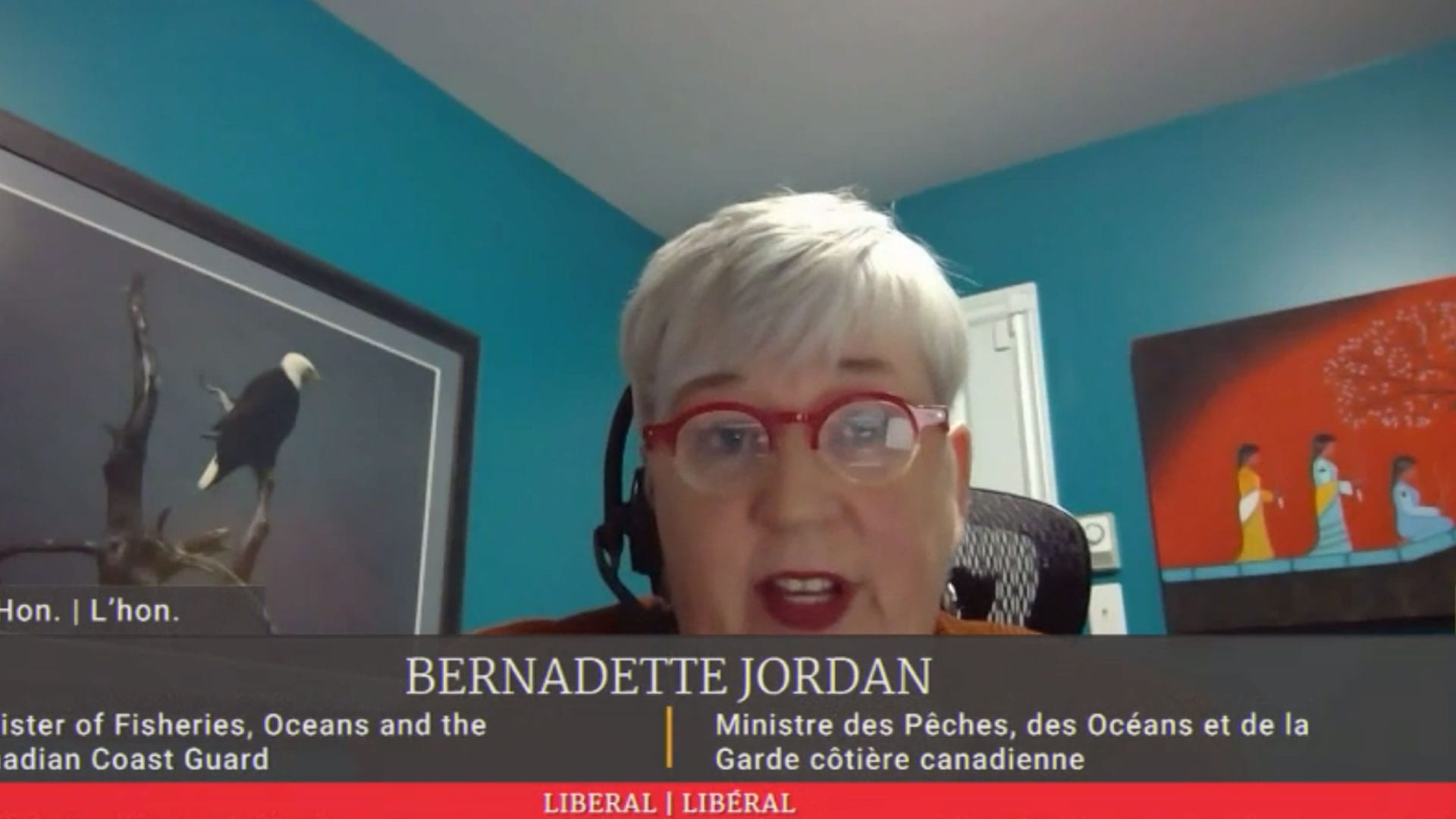With 260 years since treaties were signed and 21 years since the Marshall decision, Mi’kmaq are done patiently waiting for the Department of Fisheries and Oceans (DFO) to implement an inherent right they know they have.
“How much longer should Mi’kmaq be patient?” host Dennis Ward asked Fisheries Minister Bernadette Jordan on APTN National News Thursday.
“This is something that, you’re right, it has been 21 years. We have made incremental progress over that time, but a lot more needs to be done,” Jordan replied. “So, it’s something that I am absolutely committed to making sure that we move forward on.”
In 2019, the federal government promised the Mi’kmaw and Maliseet nations it would honour the treaties and uphold the laws of the highest court in the land.
“I make my commitment to ensure that my department moves forward on a path that respects Aboriginal treaty rights and the right to a modern livelihood for Mi’kmaw and Maliseet First Nations as affirmed by the Marshall decision,” said then Fisheries Minister Jonathan Wilkinson in a statement that was read aloud in the Senate.
The upper chamber was debating amendments to the federal Fisheries Act. The promise was personally directed at Sen. Dan Christmas, a former Membertou First Nation councillor and friend of the late Donald Marshall Jr.
“I know that the ruling of 20 years ago on the treaty rights of the Mi’kmaw and Maliseet First Nations is more than just an issue to him,” Wilkinson stated of Christmas. “It is a matter of sacred and binding trust.”
A year later, with a Mi’kmaw treaty fishery suffering arson, vandalism and violent mob attacks at the hands of commercial fishers in Nova Scotia, the personal and collective promise languished, unfulfilled.
“Despite these encouraging words, and despite the recognition that, to the Mi’kmaq, protection and affirmation of such rights are indeed a matter of sacred and binding trust, we find ourselves at a perilous crossroads fraught with challenges,” Christmas wrote in a letter to Membertou Chief Terry Paul.
“Two things are absolute: the promise by the Minister didn’t manifest any changes in DFO’s approach to moderate livelihood – and that consequently the patience of the Mi’kmaq has been understandably and undeniably tried beyond all limits.”

The amendments that Bill C-68 made to the Fisheries Act in 2019 did not address treaty rights, but Jordan pointed to them as a move in the right direction.
“That is something that is a positive step forward. We’re making sure that we’re working with First Nations to not only implement their treaty right but to make sure that there’s understanding at all levels on what treaty rights mean,” said Jordan.
Jordan also defended the reconciliation agreements her department has pushed for the last three years. These deals offer cash and access to the commercial fishery through banked licences. But in exchange First Nations must sideline rights-based fishing and follow DFO rules.
“No one’s asking anyone to give up their rights. What we’re asking is that we work in partnership, that we support First Nations with their efforts. We’ve always been willing to communicate and work with them to find the best way forward,” said Jordan.
Christmas’ letter outlines a three-point plan which he and two other Mi’kmaw parliamentarians pitch as an alternative to the reconciliation deals.
The plan involves brining Crown-Indigenous Relations into the talks, establishing an Atlantic First Nations Fisheries Authority and instituting the Mi’kmaw legal order of Netukulimk – a traditional philosophy of sustainable harvesting – as a governing principle.
The minister again was tight-lipped on what is or isn’t on the negotiating table with First Nations. She wouldn’t say whether Ottawa would consider something like a Mi’kmaw-led fishery authority.
Sipekne’katik Chief Mike Sack, whose band is at the centre of the conflict, suggested some negotiations aren’t going well and called for her to step down.
“If they want to break off talks with us, then we’ll take alternative routes,” Sack said in an interview with The Canadian Press. “If the minister is not willing to work with us, then maybe she should step down if she’s not capable of doing the job.”
Two months after launching the treaty fishery, Sack released Sipekne’katik’s catch volume: 100,000 pounds, less than 0.05 per cent of the average commercial haul in that area.
He said it constitutes less than one commercial licence prior to the opening of the industrial season, which will see 990 licences fished with a potential to land 90 million pounds of the highly-prized crustacean.
“We are frustrated to be acting in good faith and to now have our request for a meeting with the Minister go unanswered adds insult to injury,” he said.
-With files from The Canadian Press and APTN News









